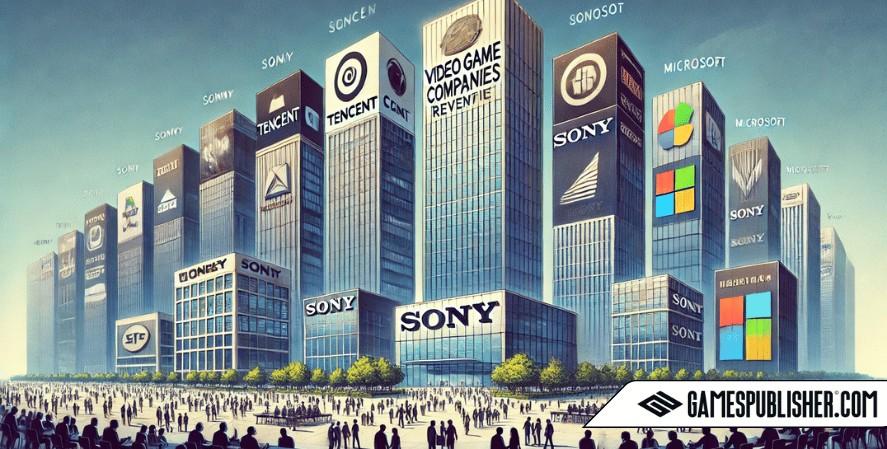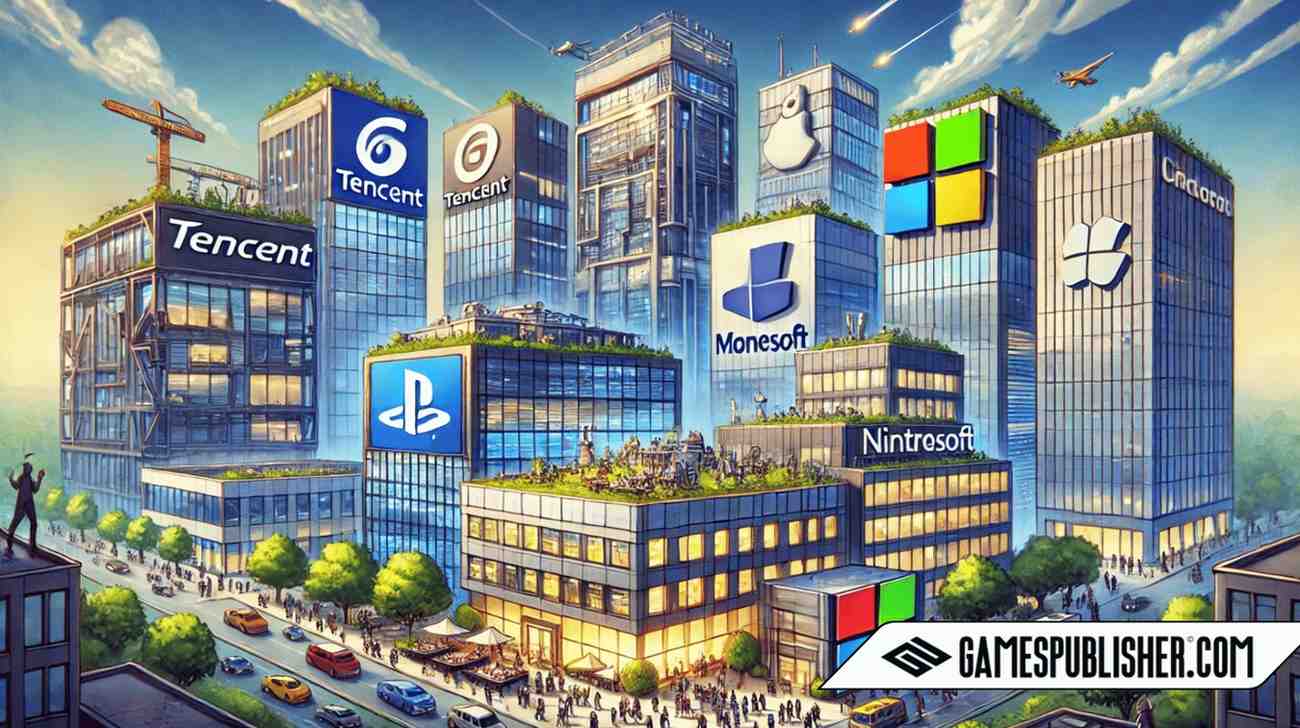The video game industry has grown from a small hobby to a massive global business. Today, it is one of the biggest entertainment industries, earning more money than movies and music.
For people who want to make, publish, or invest in video games, knowing the main companies in this field is very important. This knowledge helps understand the industry and make smart choices.
At the heart of this industry are the top gaming companies. These companies have shaped the games we play today. They create popular game series, lead in new technology, and set the trends for the future.
In this article, we will look at some of the biggest gaming companies in the world. We will explore their impact on the industry, their financial success, and their key contributions.
Gamespublisher.com is a helpful resource for anyone interested in the gaming industry. It offers detailed information about these key companies. By providing in-depth analysis, Gamespublisher.com helps developers, publishers, and investors understand the video game world better.
1. The Evolution of the Gaming Industry

Historical Context
The video game industry started in the mid-20th century with simple arcade games like Pong and Space Invaders. In the 1980s and 1990s, home consoles such as the Nintendo Entertainment System (NES) and the Sega Genesis became popular. These consoles brought video games into many homes, creating a new group of players.
Rise of Major Companies
During this time, some companies became leaders in the industry. Nintendo changed home gaming with its creative consoles and popular game series like Super Mario and The Legend of Zelda.
Sega, another major player, introduced characters like Sonic the Hedgehog. Sony entered the gaming world in the mid-1990s with the PlayStation, which focused on games for older audiences and better graphics. Microsoft joined the scene in 2001 with the Xbox, setting a new standard for online gaming.
Market Growth
The gaming industry has expanded rapidly over the last few decades. In 2023, the global gaming market was worth over $200 billion. This growth is not only about money but also about creating jobs and developing new technologies. The rise of digital game downloads, mobile gaming, and online platforms has made gaming more popular and accessible.
2. The Biggest Video Game Companies by Revenue

Tencent
Overview: Tencent, a company from China, is the largest video game company by revenue. Tencent’s success comes from creating its own games, investing in other game companies, and forming partnerships.
Key Games: Some of Tencent’s most popular games include Honor of Kings and PUBG Mobile. Tencent also owns a big part of League of Legends by owning Riot Games.
Global Influence: Tencent’s reach goes far beyond China. It has invested in big game companies like Epic Games, Activision Blizzard, and Ubisoft. These investments make Tencent a powerful player in the global gaming market.
Sony Interactive Entertainment
Overview: Sony Interactive Entertainment (SIE) is well-known for its PlayStation consoles. Sony is a leading company in both making consoles and publishing games.
Key Games and Franchises: Sony’s popular game series include God of War, Uncharted, and Gran Turismo. These games are known for their great stories, graphics, and gameplay.
PlayStation Network: The PlayStation Network (PSN) is a big part of Sony’s gaming business. It allows online gaming, game purchases, and streaming. PSN and the PlayStation Plus service bring in a lot of money for Sony and offer valuable services to millions of PlayStation users.
Microsoft (Xbox Game Studios)
Overview: Microsoft’s Xbox Game Studios is central to its gaming strategy. This strategy includes the Xbox console and a wide range of game studios. Microsoft focuses on both hardware (consoles) and software (games) to lead the industry.
Key Acquisitions: Microsoft has strengthened its position by buying other companies. Notable purchases include ZeniMax Media (the parent company of Bethesda) and a planned purchase of Activision Blizzard. These acquisitions bring games like The Elder Scrolls, Fallout, Call of Duty, and Overwatch under Microsoft’s control.
Game Pass: Xbox Game Pass is a subscription service that offers a large library of games for a monthly fee. This service provides great value to gamers and has helped Microsoft reach more people. Game Pass is a key part of Microsoft’s vision for the future of gaming.
Nintendo
Overview: Nintendo has a long history as a leader in the gaming industry. Known for its creativity, Nintendo has consistently delivered memorable gaming experiences.
Iconic Games and Consoles: Nintendo’s impact is best seen through its famous games like Mario, Zelda, and Pokémon. These games are loved by many players around the world. The Nintendo Switch, a console that can be used both at home and on the go, shows Nintendo’s innovative spirit.
Innovative Approaches: Nintendo’s way of doing things is always different. Whether it’s the motion controls of the Wii or the portability of the Switch, Nintendo focuses on making fun and easy-to-play games for everyone.
3. Emerging Giants in the Gaming Industry

Epic Games
Overview: Epic Games became well-known thanks to Fortnite, a game that has become hugely popular. Epic is also known for its Unreal Engine, a tool used by many game developers around the world.
Epic Games Store: Epic has entered the digital game sales market with the Epic Games Store. By offering exclusive games and better revenue deals for developers, Epic is challenging big players like Valve’s Steam.
Activision Blizzard
Overview: Activision Blizzard was formed when two big companies, Activision and Blizzard Entertainment, merged. Together, they have created some of the most popular games in the industry.
Franchises: Activision Blizzard’s games include hits like Call of Duty, World of Warcraft, and Overwatch. These games have sold millions of copies and have strong online communities and esports competitions.
Take-Two Interactive
Overview: Take-Two Interactive is known for its high-quality games and strong stories. Through its divisions, Rockstar Games and 2K, Take-Two delivers top-notch gaming experiences.
Key Titles: Take-Two’s success is largely due to its big game series like Grand Theft Auto and NBA 2K. These games are popular for their deep gameplay and attention to detail.
4. The Role of Mobile Gaming Companies

Importance of Mobile Gaming
Mobile gaming has become a big part of the gaming industry. Thanks to the widespread use of smartphones and tablets, mobile games are easy to access and play. They attract a wide range of players and make a lot of money.
Key Players
NetEase: NetEase is a key company in mobile and online gaming, especially in China. The company has created popular games like Fantasy Westward Journey and works with other companies to bring games like Minecraft to China.
Supercell: Supercell, a game developer from Finland, has achieved huge success with games like Clash of Clans, Clash Royale, and Brawl Stars. Supercell focuses on making high-quality games that are fun and engaging.
Revenue Models
Mobile gaming companies usually make money through in-app purchases and ads. This “freemium” model lets players download games for free and offers extra content or features for a price. This approach has proven very profitable, even though only a small percentage of players spend money.
5. Challenges and Controversies

Monopolistic Concerns
As big companies continue to dominate the gaming market, there are growing worries about monopolies. The buying strategies of companies like Tencent and Microsoft raise questions about competition and the effect on smaller developers.
Ethical Issues
The gaming industry faces several ethical challenges, such as the long hours and high pressure that game developers often face, known as crunch culture. Issues like loot boxes, which are similar to gambling, have also sparked debates about player rights and safety.
Regulatory Scrutiny
As the gaming industry grows, governments are paying more attention to these companies, especially concerning antitrust laws. Regulators are looking at ways to ensure fair competition and protect consumers, which will likely continue as the industry expands.
6. The Future of the Gaming Industry

Emerging Markets
Emerging markets, such as those in Southeast Asia and Africa, are becoming important for the gaming industry. As more people get internet access and smartphones, these areas offer new opportunities for game makers.
Cloud Gaming
Cloud gaming has the potential to revolutionize how we experience games. It allows people to play high-quality games on any device with an internet connection.
Companies like Google (Stadia), Amazon (Luna), and Nvidia (GeForce Now) are investing in this area. However, issues like internet speed and reliability still need to be solved for cloud gaming to be fully successful.
Sustainability
As the gaming industry grows, its impact on the environment also increases. Major companies are starting to take steps to be more sustainable, such as making energy-efficient hardware, reducing carbon footprints, and supporting green initiatives. These efforts are important for the long-term health of the industry and the planet.
Conclusion
Knowing about the biggest gaming companies and their roles in the industry is important for anyone involved in making, publishing, or investing in games.
These companies not only shape how we play games today but also influence what gaming will look like in the future. By following industry trends and understanding the power of these major companies, we can better prepare for what’s next in the world of gaming.
Gamespublisher.com is a great resource for staying informed about these trends and understanding the impact of the major players. As the gaming industry continues to evolve, it will bring new opportunities and challenges for gamers and industry professionals alike.
Loading survey...

